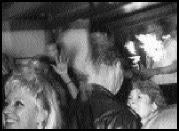CIVIL RIGHTS
Westlake Mall security guards picked on the wrong demonstrator in February, when they singled Beth Sanders out of a crowd of war protesters waiting to board the monorail at its Westlake station. Sanders, who was queued up with her daughter near the food court when a security guard ordered her to lower her anti-war sign, is suing the mall and the city, alleging her free-speech rights were violated because the station platform, and the path leading to it, is in the public right of way. “They can’t privatize that public space,” she says. Randy Baker, Sanders’ husband and attorney, says Westlake “isn’t just a mall”—it’s the only access point for a public transportation system, which he says makes the path to the monorail, like the monorail itself, public. “When a person is walking to the monorail in the mall, so far as I’m concerned, they’re essentially using a sidewalk,” Baker says. “If you don’t like it, don’t look.” They are seeking an injunction banning Westlake from limiting free expression in public space inside the mall. But their case could have implications beyond the confines of Westlake Mall—tentative plans show the new monorail stopping inside a private building at Second and Pike.
MONORAIL
Monorail fans lost a significant battle in Olympia this week, as a House bill that would have required Seattle residents to register their cars in the city and ensured that taxpayers would repay monorail bonds even if the monorail agency is dissolved died silently at the hands of Sen. Jim Horn, RMercer Island, who kept the bill locked up in his Highways and Transportation Committee. Horn, who wasn’t available for comment, has said he felt the Seattle Popular Monorail Authority (SPMA) was rushing to issue bonds too quickly, an opinion echoed by House Transportation Committee chair Rep. Ed Murray, D-Seattle, and Washington state Treasurer Michael Murphy. Despite this seemingly insurmountable setback, the monorail agency remained officially optimistic. “We’re still hopeful that the legislation will move forward,” says SPMA spokesperson Paul Bergman. “We don’t think it’s over.”
CITY HALL
Barely a whisper has been heard over Mayor Greg Nickels’ new noise ordinance, cleverly constructed so that it won’t piss off the music community or the American Civil Liberties Union. The new proposal, ostensibly aimed at house parties around the University of Washington, would prohibit audible noise in residential neighborhoods after 10 p.m. on weekdays and 11 p.m. on weekends. Break the law, and you could get slapped with a fine—between $250 and $500—and up to six months in jail. Break it more than three times in 12 months, and you could be evicted. Bob Scales, a policy analyst who helped craft the ordinance, says under existing law, police can only ask people to pipe down; if the new law is passed, Scales says, “they won’t have to issue a warning” or talk to neighbors before ticketing rowdies.
Musicians, who opposed a 1999 noise law, have been all but silent on the current proposal, because it doesn’t apply to clubs. Still, promoter Dave Meinert admits that the new rules “seem a little extreme for the city.” The ordinance will get a public hearing this Thursday night. Now, if only they could do something about barking dogs.






